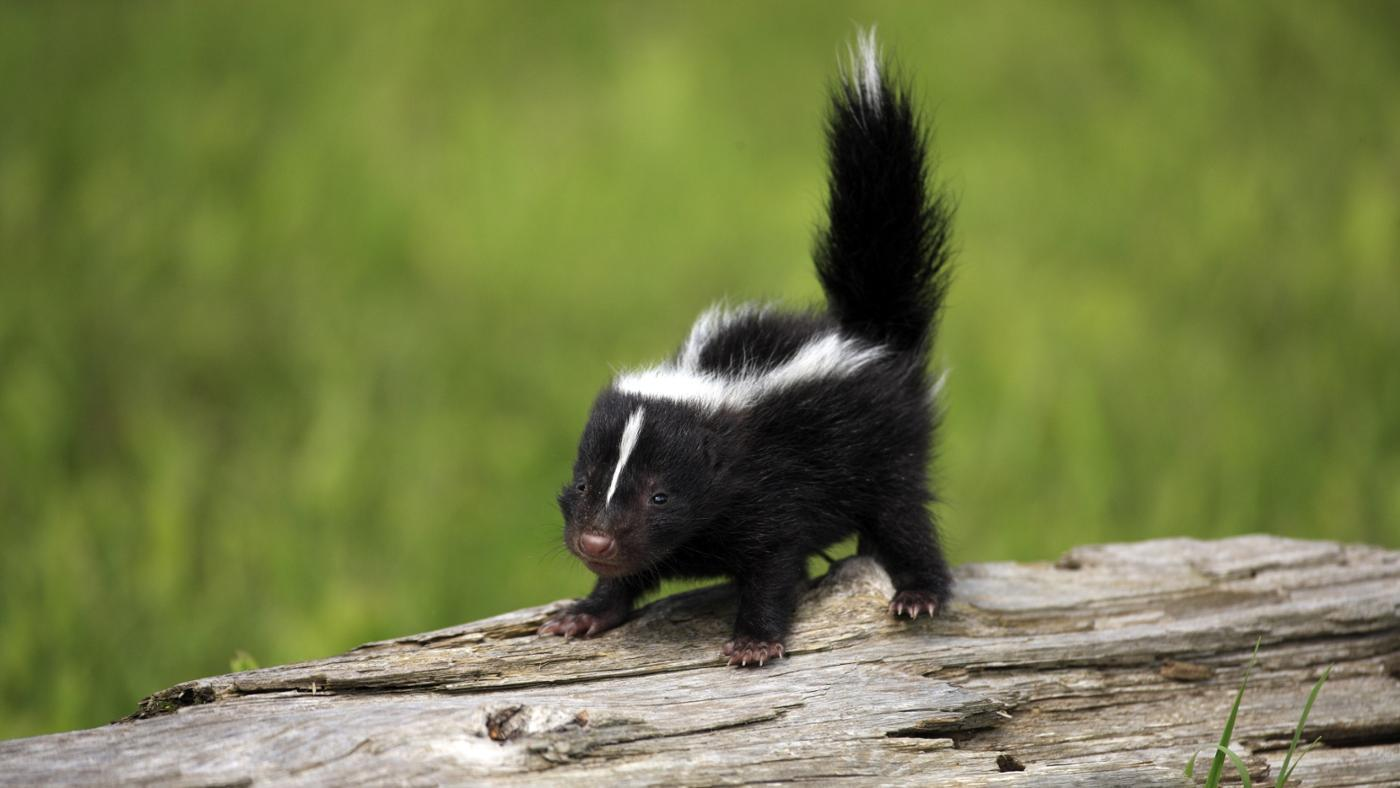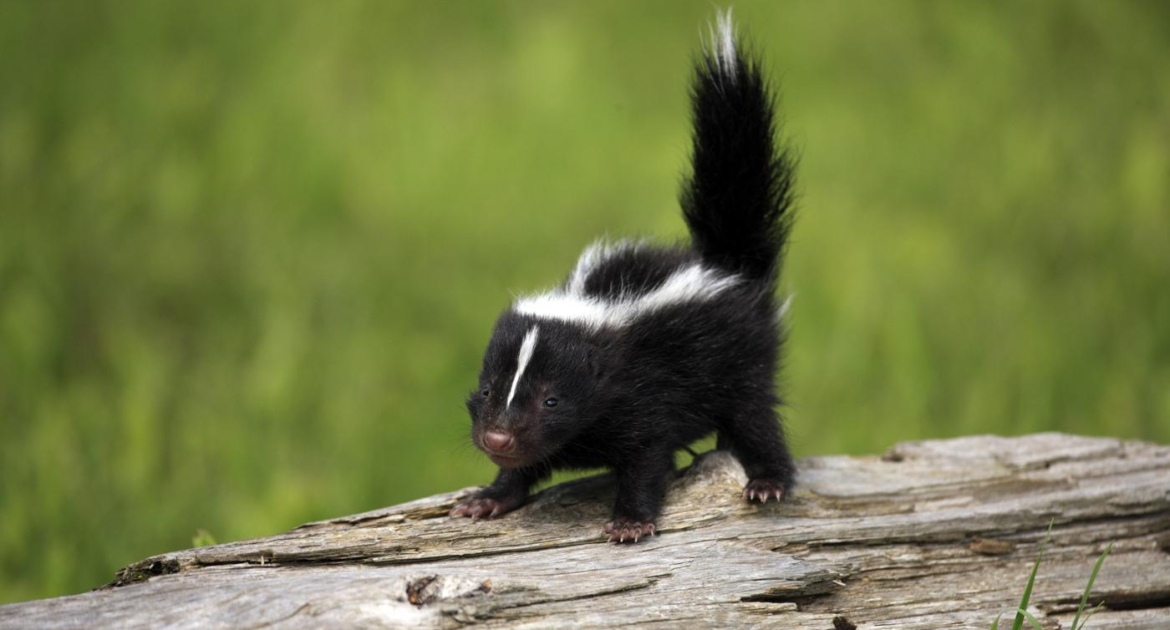Skunks might be adorable to look at, but they are wild animals that can become a nuisance if they live on your property. Certainly one of the most well-known facts about skunks is their unique self-defence mechanism in the form of a spray with a powerful odour. If you notice any foul smells around your home or property, chances are you have a skunk infestation on your hands, at which point you should think about professional skunk control services.
What Happens During and After Skunk Mating Season?
Skunks hibernate after a fashion in the winter, then emerge in early spring ready to mate. Skunk mating season typically starts in February and extends through March. With a gestation period of approximately two months, female skunks give birth between April and May. Skunks do not form long-term mating pairs. Males mate with several different females over the course of their lives. Females may use a form of skunk spraying to spurn suitors that they find unsuitable. This is one reason why skunk smells are more common in late winter and early spring.
Skunks spend most of the winter in a den, but after mating, a female skunk looks for a new den in which to raise the babies. Skunks are burrowing animals but prefer not to have to dig a whole new den. Rather, they may look for the abandoned den of another animal. If they do dig a new den, they typically choose a site under a sturdy object that provides some protection. In the wild, this may be a log or a rock, but skunks may also burrow under decks, porches, or sheds.
A litter of skunks typically consists of four to eight babies. When they are born, they are completely dependent on their mother for food and protection. They wean at approximately six weeks, at which point they start following their mother outside to learn how to find food for themselves. By late summer or early fall, each baby skunk is mature enough to start living on its own.
What Are Some Signs That You Could Potentially Have Skunks?
There are several ways to determine your property or home has been infested by unwanted visitors such as skunks:
- Skunk Smells: A musky odour is usually present to a low degree when skunks are living nearby. If the skunk has to spray in self-defence, the smell becomes exponentially stronger.
- Holes in Lawn: These are typically shallow, though they may be numerous. Skunks dig holes to find food, particularly insect larvae that live under the dirt.
- Damage to Plants: Skunks may knock over plant containers or strip leaves from garden vegetation for food. It is likely that a skunk is a culprit if the damage only occurs close to the ground.
- Paw Prints: Skunks may leave paw prints behind in snowy or muddy areas. They may also track mud over the patio. Skunks have five toes on each paw, each with a long claw. However, the fifth toe is smaller than the others and doesn’t always show up as distinctly. Therefore, don’t rule out the possibility of a skunk if you find tracks with only four toes.
- Signs of Burrowing: Look for holes or piles of displaced dirt under decks, sheds, porches, and steps. This indicates that a wild animal has made a den on your property, and if the other signs are present, you can make an educated guess that it is a skunk.
Why Is Getting Rid of Skunks Something You Should Leave to the Professionals?
Do-it-yourself attempts at skunk removal put you at risk of being sprayed. The smell is difficult to remove and can linger for days or weeks at a time. Sometimes it is not possible to launder clothes that have been sprayed by a skunk, and they have to be disposed of.
However, spraying you is not the worst that skunks could potentially do to you when defending themselves. Skunks are generally docile creatures, but females can be fiercely protective of their babies. If spraying you doesn’t work, they may resort to biting and scratching. Skunks are frequent carriers of rabies, and their bites and scratches could expose you to the virus.
How Can You Keep Skunks From Building a Den on Your Property?
You can deter skunks from your property by removing any sources of food. This can be tricky since skunks are omnivores and can eat almost anything, but you can avoid feeding pets outside, store garbage in sealed containers, plant your garden in raised beds, and treat your lawn for grubs, one of the skunks’ favourite foods.
Repair any holes in your fence to prevent skunks from getting through. Skunks can’t climb, so pay particular attention to the bottom of the fence. Seal off any holes around the house or shed with chicken wire so the skunks can’t get in. However, before you do that, first make sure that there are no skunks or any other animals in the hole. Otherwise, you’ll trap them down there, and because they won’t be able to go out and find food, they’ll die. This is inhumane to the animals and causes even more problems for you as the property owner.
Skunks on Your Property? Contact Skedaddle for Help With Professional Skunk Control Services
Removing skunks by yourself may seem like a good idea, but it isn’t optimal for either you or the animals. You could come to harm as a result of your amateur skunk removal efforts, or you could hurt the animals inadvertently.
For example, if you separate the baby skunks from their mother before they are weaned, the baby skunks will die because they are too little to find food for themselves. Our technicians remove the babies gently by hand and then put them in a heated box to keep them safe until their mother comes to collect them and move them to a new den.
Remember that professional skunk control services are the absolute best removal option. Skedaddle Humane Wildlife Control is a company that has over thirty years of experience in removing both skunks and their babies from people’s homes humanely and safely for all parties involved. Rest assured that Skedaddle is the right choice for your skunk problem.




